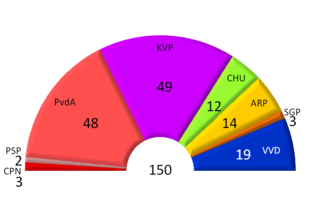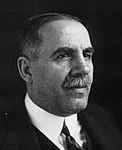
General elections were held in Denmark on 11 March 1998. Although the centre-right parties led by Venstre had been expected to win, the Social Democratic Party-led government of Poul Nyrup Rasmussen remained in power in a very close vote that required several recounts.
General elections were held in the Netherlands on 25 June 1952. The Catholic People's Party and the Labour Party both won 30 of the 100 seats in the House of Representatives. It was the first time since 1913 that the Catholic People's Party and its predecessors had not received a plurality of the vote.

General elections were held in the Netherlands on 12 March 1959. The Catholic People's Party emerged as the largest party, winning 49 of the 150 seats in the House of Representatives.

Parliamentary elections were held in Austria on 1 March 1970. The result was a victory for the Socialist Party, which won 81 of the 165 seats to become the largest party for the first time in the Second Republic, only two seats short of a majority. Bruno Kreisky of the Social Democrats became Chancellor at the head of a minority government that was tolerated by the Freedom Party of Austria in return for electoral reform that favoured smaller parties. Voter turnout was 91.8%. It was the first Socialist-led government since 1920, and the first purely left-wing government in Austrian history.
The Democratic Party is a center-right party in Bulgaria led by Alexander Pramatarski. The party is a member of the European People's Party (EPP).

Parliamentary elections were held in Greece on 7 November 1926. The Liberal Union emerged as the largest faction in Parliament with 108 of the 286 seats. The composition of the new parliament meant that the parties and factions had to work together to form a viable parliamentary government. On Kafandaris' initiative negotiations began among the main parties, leading to the swearing-in on the 4 December of a government under the premiership of Alexandros Zaimis who was not a member of parliament. The coalition consisted of the Liberal Union, the Democratic Union, the People's Party and the Freethinkers' Party. This government came to be known as the "Ecumenical government".

Parliamentary elections were held in Greece on 19 August 1928. The result was a victory for the Liberal Party, which won 178 of the 250 seats.
General elections were held in Luxembourg on 26 May 1974. The Christian Social People's Party remained the largest party, winning 18 of the 59 seats in the Chamber of Deputies. However, it went into opposition as the Luxembourg Socialist Workers' Party and Democratic Party formed a coalition government under prime minister Gaston Thorn.

General elections were held in Luxembourg on 18 June 1989. The Christian Social People's Party remained the largest party, winning 22 of the 60 seats in the Chamber of Deputies. It continued the coalition government with the Luxembourg Socialist Workers' Party.

Parliamentary elections were held in Norway on 16 October 1933. The result was a victory for the Labour Party, which won 69 of the 150 seats in the Storting.

Parliamentary elections were held in Greece on 5 March 1950. The People's Party emerged as the largest party in Parliament, winning 62 of the 250 seats.

General elections were held in Belgium on 31 March 1968. The Christian Social Party remained the largest party. Voter turnout was 90.0%. Elections for the nine provincial councils were also held.

Federal elections were held in Switzerland on 24 October 1999. Although the Swiss People's Party received the most votes for the first time in the party's history, the Social Democratic Party remained the largest party in the National Council, winning 51 of the 200 seats.

General elections were held in Liechtenstein on 11 March 1918, with a second round on 18 March. They were the first elections held in the country contested by political parties, as the Christian-Social People's Party and Progressive Citizens' Party had been founded that year. The Progressive Citizens' Party emerged as the largest in the Landtag, winning seven of the 12 elected seats.

General elections were held in Liechtenstein on 5 February 1922, with a second round on 16 February. They were the first elections held under the 1921 constitution, which resulted in some changes to the electoral system. The result was a victory for the opposition Christian-Social People's Party, which won 11 of the 15 seats.

General elections were held in Liechtenstein on 6 March 1932, with a second round on 13 March. The result was a victory for the ruling Progressive Citizens' Party, which won 13 of the 15 seats in the Landtag. This was the last election contested by the Christian-Social People's Party before it merged with the Liechtenstein Homeland Service to form the Patriotic Union.
General elections were held in Romania in May and June 1926. The Chamber of Deputies was elected on 25 May, whilst the Senate was elected in two stages in May and 10 June. The result was a victory for the governing People's Party, which, together with the allied Romanian National Party–Goldiș, Magyar Party and German Party, won 292 of the 387 seats in the Chamber of Deputies and 107 of the 115 seats in the Senate elected through universal male vote. With some exceptions, the Peasants' Party and the main branch of the National Party ran on common lists under the name of National Peasant Bloc.

Parliamentary elections were held in Romania on 2 March 1969. The Front of Socialist Unity, which had been formed a year earlier to replace the People's Democratic Front, was the only organization that contested the election; no prospective candidate could run for office without the Front's approval. Like the People's Democratic Front, the Front of Socialist Unity was dominated by the Romanian Communist Party. The Front won all 465 seats in the Great National Assembly.
The People's Party was a political party in Bulgaria between 1894 and 1920.

The United Labour Social Democratic Party was a political party in Bulgaria.



















